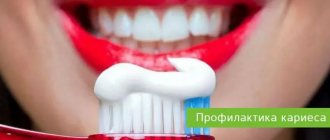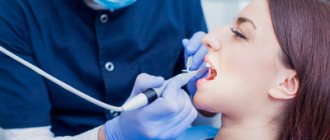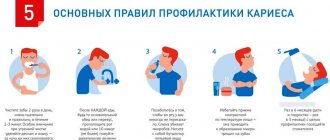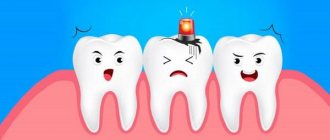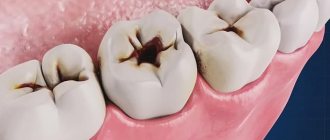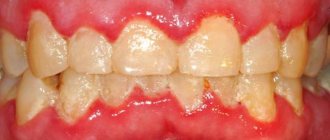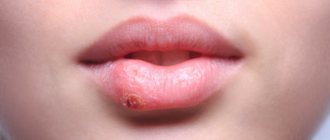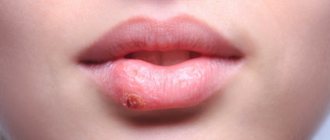Author of the article:
Soldatova Lyudmila Nikolaevna
Candidate of Medical Sciences, Professor of the Department of Clinical Dentistry of the St. Petersburg Medical and Social Institute, Chief Physician of the Alfa-Dent Dental Clinic, St. Petersburg
The human oral cavity is often called a mirror of the state of the body. A qualified dentist, after performing a visual examination of the oral mucosa and teeth, can determine what chronic diseases the patient has and advise him to see a specific doctor. Thus, diseases of the endocrine or nervous system, gastrointestinal tract or blood diseases can be diagnosed using the oral cavity.
At the same time, if there are chronic diseases in the oral cavity, then they, in turn, can become a provoking factor for the development of rheumatism, pyelonephritis and some other diseases. Remember how, for example, pregnant women before giving birth and patients before a planned operation need to obtain a certificate of oral sanitation. Therefore, prevention is very important for everyone. Moreover, we are talking not only about a beautiful and healthy smile, but also about health in general, and also, of course, about those funds from the family budget that will have to be spent on treatment at the dentist.
Prevention of oral diseases
When they talk about the prevention of oral diseases, they primarily mean:
- Self-regular oral care.
- Periodic visits to the dental clinic.
Why do you need to take care of your mouth? The fact is that after each meal, food particles remain on the teeth and mucous membranes of the mouth, as a result, upon contact with saliva, bacteria and microbes begin to multiply in the mouth, which ultimately leads to the appearance of caries, bad breath, plaque and dental plaque. stone
Some people, unfortunately, do not understand the importance of this procedure, erroneously claiming that animals don’t brush their teeth or anything. But we must not forget that animals live much shorter lives, and, most importantly, they monitor their diet, consuming sufficient quantities of food of plant origin.
Eating habits
The condition of our teeth largely depends on what we eat. It is recommended to minimize the intake of fast carbohydrates (various sweets, flour, carbonated sweet water, etc.). It is necessary to saturate the diet with fermented milk products, fresh fruits and vegetables. It is important that the body does not experience a deficiency of vitamins or microelements.
Important! Food that is too cold or hot is extremely harmful to teeth; this can lead to increased sensitivity of the enamel.
Brushing your teeth with a toothbrush
The most important thing in preventing oral diseases is brushing your teeth. Every person, regardless of age, including children, should brush their teeth morning and evening. Moreover, observing certain rules.
- You need to brush your teeth for at least five minutes.
- Brush your teeth with rotational movements, otherwise, if you brush straight, the plaque will simply be driven into the gum pockets and between the teeth.
- Do not press the brush too hard to avoid damaging the enamel.
- When brushing your teeth, mentally divide all your teeth into four sections and brush each one separately so as not to spread germs throughout the jaw.
- You need to brush not only the teeth from above, but also near the gums, at the base, and also the gums themselves.
- Dentists recommend placing the brush at an angle of 45 degrees when brushing your teeth.
- First you need to brush the far teeth of the upper jaw, then the front teeth, turning the brush vertically, and then start cleaning the teeth of the lower jaw. Finish brushing your teeth by massaging your gums and brushing your tongue.
- In this case, you should take no more than a pea-sized amount of toothpaste.
It's more efficient
Without the necessary care and regular preventive maintenance, teeth are gradually destroyed, and the condition of the gums worsens. During treatment, the natural tissues of the crowns are gradually replaced by artificial ones: dentures, fillings, inlays. They are reliable, but their service life is limited. For this reason, it is more effective to try to preserve your own teeth for as long as possible, to prevent severe destruction of crowns and the appearance of advanced caries. Prevention of dental and periodontal diseases helps to do this. It helps not only maintain, but also gradually improve the condition of teeth and gums: strengthening enamel with the help of remotherapy, improving the appearance of a smile as a result of cleaning and whitening.
Prevention helps to control the condition of teeth and gums, preventing the occurrence of serious diseases - those that will require prosthetics or implantation, complex, expensive treatment. At the DentoSpas clinic, preventive examinations and dental consultations are provided free of charge.
How to choose the right toothbrush
Just as important as brushing your teeth is choosing a good toothbrush. Experts advise purchasing a brush with artificial bristles, which is considered more hygienic, practical and durable. As for the optimal degree of hardness, if the patient does not have any special indications, a regular brush of medium hardness will suit him.
It is also worth paying attention to the size of the toothbrush - optimally it should cover three teeth.
We must not forget that the brush needs to be changed periodically. It’s difficult to say how often to do this, because for some the brush can wear out in a month, while for others it can last two to three months. This depends on many factors, in particular, how often you brush your teeth, with what force you do it, how long the procedure lasts, and what toothpaste you use.
Therefore, some dentists advise purchasing toothbrushes with colored tufts of bristles, which are indicators. On a new brush they are always bright, and when the bristles wear out, they take on a pale blue tint. Noticed this on your toothbrush? It's time to go to the pharmacy for a new one.
If your brush does not have such indicators, simply change it at least once a quarter.
Recently, electric toothbrushes have become popular, although the attitude towards them from professional dentists is rather ambiguous. Therefore, before purchasing such a modern brush, it is better to consult your doctor.
Battery-powered teeth polishing devices are also available on the market. According to dentists, they can be used, but not often, as they can damage the enamel.
When all the baby teeth are there
How strong are they? Already in the 6th week of pregnancy, baby teeth begin to form. All of their 20 crowns are already fully developed by the time the child is born and take their permanent place in the jaws, even those that appear by the end of the first year of life.
Between 6 and 8 months of life, the first teeth appear. Alternately, they cut through the swollen gums. Sometimes this is a painful process, and the child worries and cries more often. In some cases, teething toys help, but how to deal with mom's loving concern? After all, in fact, there is no such disease as “teething.” Research shows that rising temperatures and other ailments during this period of life are a coincidence.
By the time all 20 baby teeth have erupted—which takes about 2 years—each one needs care.
Toothbrush care
There are also rules on how to care for your toothbrush so that it helps maintain oral health and does not harm your teeth and gums. What is needed for this?
- Never give your own toothbrush or borrow someone else’s toothbrush, even from your own family members.
- After each brushing procedure, the brush should be washed with soap. You can use it next time only when it is completely dry.
- It is advisable for each person to have two brushes: one for use at home, the second “travel brush” to take with you on trips.
- To clean the brush from germs, you can use various antiseptics or rinses.
- Each brush should be dried in a cup separately from the others, without touching them. Ideally, you can use a “cap” or case for each brush.
Preventive dental procedures
At your dentist’s appointment, you can perform several preventive procedures that will protect your teeth from various diseases:
|
How to choose toothpaste
When choosing a toothpaste, it is a good idea to consult your doctor. Do not get carried away with abrasive toothpastes: it is better to alternate them with regular ones. For children, you should buy special children's pastes, according to their age. For people with sensitive gums and teeth - professional pastes.
In general, all toothpastes that are available in pharmacies today can be divided into:
- hygienic, which are suitable for everyone, as they do not contain special medicinal components;
- therapeutic and prophylactic: they can also be used daily as a prophylactic against various diseases;
- medicinal: they should be used only as prescribed by a doctor.
If for some reason a person does not like toothpastes, then he can use special dental gels to clean his teeth. However, we must not forget that in terms of their abrasive properties they are significantly inferior to pastes.
And during the day, when it is not possible to use toothpaste, or after morning or evening brushing, you can use dental elixirs.
We recommend Asepta toothpastes. They are designed to meet all oral hygiene requirements. The components they contain effectively clean teeth, strengthen enamel, prevent the occurrence of caries, and gently freshen breath.
How to avoid caries?
Depending on the depth of damage to hard tissues, there are 3 stages of caries - initial (spot stage), medium, deep. The rate of destruction of dental structures varies. In adults, the disease is predominantly sluggish and chronic. Children are more often diagnosed with an acute form of the disease with rapid destruction of dental structures. Inattention to the condition of teeth leads to progression of the disease. A carious lesion from the spot stage very quickly passes into the middle form, when dentin is destroyed and a visually noticeable defect is formed - a carious cavity.
How to avoid caries? Simple methods of primary prevention will help with this, most relevant when there is no visible damage to dental tissues.
Clinical researches
ASEPTA toothpastes are clinically proven effective. For example, repeated clinical studies have proven that regular use of preventive toothpaste ASEPTA SENSITIVE for a month can reduce bleeding gums by 62%, reduce the sensitivity of teeth and gums by 48% and reduce inflammation by 66%.
In addition, it was proven that regular use of professional toothpaste ASEPTA COFFEE AND TOBACCO for a month improved the hydration of the mucous membrane by 3.3 times, the remineralizing efficiency increased by 3.9 times, at the same time, the cleansing effect has increasing dynamics and reaches 60.5% at 4 weeks of use.
Sources:
- Clinical studies of antisensitive toothpaste “Asepta Sensitive” (A.A. Leontyev, O.V. Kalinina, S.B. Ulitovsky) A.A. LEONTIEV, dentist O.V. KALININA, dentist S.B. ULITOVSKY, Doctor of Medical Sciences, Prof. Department of Therapeutic Dentistry, St. Petersburg State Medical University named after. acad. I.P. Pavlova
- Report on determining/confirming the preventive properties of toothpaste “ASEPTA PLUS” COFFEE and TOBACCO Author: doctor-researcher A.A. Leontyev, head Department of Preventive Dentistry, Doctor of Medical Sciences, Professor S.B. Ulitovsky. First St. Petersburg State Medical University named after. acad. I.P. Pavlova, Department of Preventive Dentistry
- Report on determining/confirming the preventive properties of toothpaste “ASEPTA PLUS” GENTLE WHITENING” Author: doctor-researcher A.A. Leontyev, head Department of Preventive Dentistry, Doctor of Medical Sciences, Professor S.B. Ulitovsky First St. Petersburg State Medical University named after. acad. I.P. Pavlova, Department of Preventive Dentistry
Professional hygiene
Modern methods of preventing dental caries involve in-office hygienic cleaning twice a year. Professional hygiene is aimed at removing bacterial plaque and mineralized formations (plaques, stones) from the supragingival and subgingival parts of the tooth. Hygienic cleaning includes the following steps:
- Removal of hard and soft deposits using the AIR-FLOW method or ultrasonic scaler.
- Polishing the surface of the teeth with an abrasive paste.
- Protection of enamel with fluorine varnish.
Hygienic procedures are painless and carried out quickly. Another plus is that the dentist gets the opportunity to accurately assess the condition of the oral cavity and detect pathology at the initial stage. Each stage can be carried out as an independent procedure. But it is a complete hygiene complex that will ensure effective prevention of diseases of the teeth and gums.
Dental X-ray
A dental x-ray allows you to obtain detailed information about the condition of your teeth and see them completely from root to crown.
Such a picture is necessary to determine:
- depth and magnitude of carious processes;
- condition of the roots and adjacent tissues;
- periodontitis;
- periodontitis;
- location of teeth in the jawbone;
- presence of abnormalities and neoplasms;
- inflammatory processes under fillings;
- possible destruction under artificial crowns;
- complications associated with wisdom teeth, etc.
Periodontal diseases.
A healthy periodontium - a multicomponent complex of tissues surrounding the tooth - ensures complex processes of restructuring the root tissues of temporary and permanent teeth, prevents tooth dislocation during biting and chewing food and in other situations, distributes the load and prevents the tooth from being driven into the bone, and also serves as protection for the internal environment body from the aggressive environment of the oral cavity.
In the depths of a thick layer of dental deposits, i.e. With poor oral hygiene, anaerobic periodontopathogenic microorganisms actively develop - Neisseria, Bacteroides, Prevotella, Actinobacillus and others.
Feeding mainly on proteins, releasing proteolytic enzymes and toxic metabolic products, they attack the epithelium and cause an inflammatory reaction of the gums (swelling, bleeding, pain), i.e. gingivitis. With high aggressiveness of the microflora and/or in the absence of proper protection and tissue regeneration, microorganisms destroy not only epithelial, but also connective tissue (ligaments, bone), move along the tooth root, depriving it of its connection with the bone, as a result of which the teeth become increasingly mobile - those. periodontitis develops.
Dentistry in Ivanteevka will cure everyone’s teeth
Dental clinic "Sanident" is one of the leading ones in Ivanteyevka. We provide services for the treatment of dental diseases of various forms. Our specialists use only the latest European equipment, high-quality materials and reliable tools. We employ highly qualified doctors who constantly improve their knowledge and are able to solve any problem related to dental health. We provide high-quality treatment of caries, prosthetics, installation of implants, whitening and much more. With us you will get a truly healthy and radiant smile.
Complex dentistry "Sanident" is located at the following addresses:
- Ivanteevka, st. Novoselki, 4 (Ivanteevka railway station);
- Shchelkovo, st. Central, 80 (railway station Voronok).
